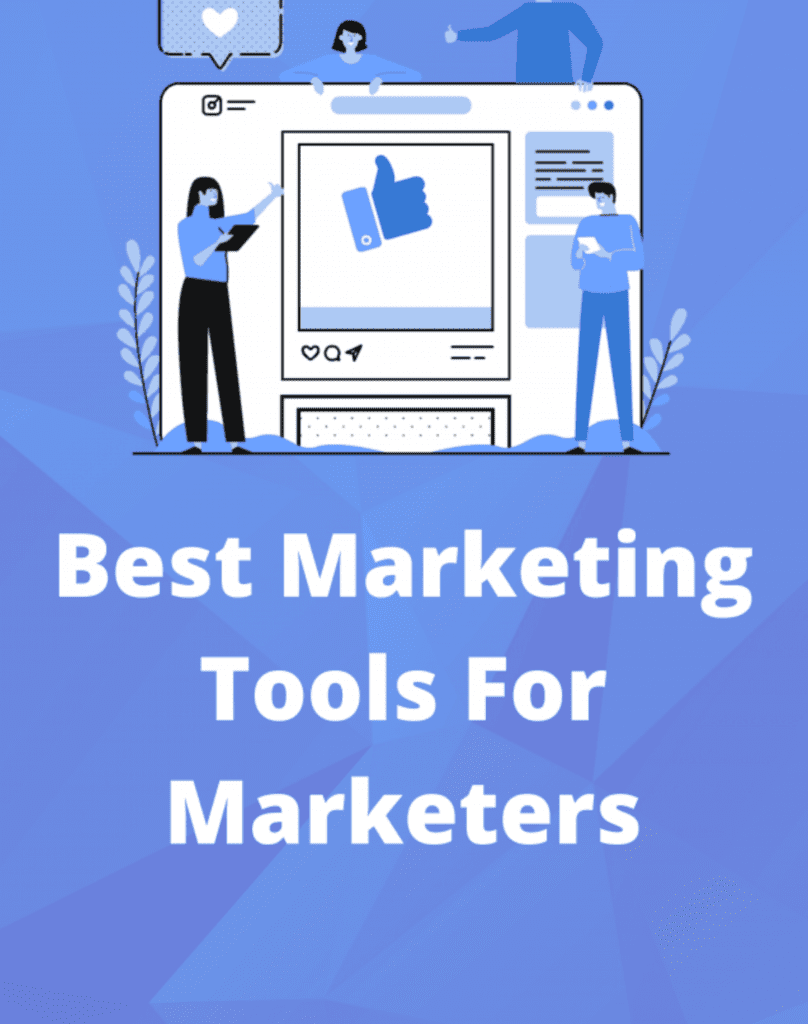
While no content marketing tool can replace a solid strategy and talented humans, having the right tech stack can definitely help you get the job done better, easier, and more efficiently.
Coworkers are discussing content marketing tools.
There are hundreds of content marketing tools available – some free or cheap – and some very expensive. They also serve various purposes from content ideation to production to promotion, optimization and more. The content marketing technology landscape is growing every year.
This post will help clarify these decisions for you. We’ll outline the top content marketing tools available now.Here are 35 best content marketing tools that are recommended.
The best content marketing tools

- HubSpot
- WordPress
- Google Docs
- Hawaiian story
- In terms of grammar
- Yost
- Bazoo
- Letters
- Brafton
- Woodyard
- loom
- Trello
- Air table
- Google Analytics
- hot jar
- Google Optimize
- Rebellion
- The Stocks.IM
- Canva
- Adobe Photoshop
- Pixels.com
- QuestionDB
- MixKit
- CoSchedule Headline Analyzer
- Asimilar Web
- ShareThis
- Content Idea Generator
- FollowerWonk
- Hemingway Editor
- AllTop
- Clearscope
- Wordable
- Explosive topics
- TubeBuddy
1. Marketing Center
Content Marketing Tools: HubSpot Marketing HubBest for: Integrating multiple content marketing tools into one central location.
What we love: HubSpot’s tools and systems grow with your business, allowing you to scale seamlessly.
HubSpot offers many content marketing tools, and many of them are free to try. These include:
- A powerful form builder
- Pop-up tools
- Live chat and chatbots
- And all-in-one WordPress plugin for marketing
In addition to free content marketing tools, if you really want to build a growth machine, HubSpot has a world-class CMS and the most powerful marketing automation platform in the industry, and you can centralize everything within a free CRM. Allows to create This means that, at every stage of a company’s growth, HubSpot has a solution that can help you build your content marketing program.
HubSpot also builds products for sales and service teams. Thus, it can truly be the ground control for your entire business.
2. WordPress
Content Marketing Tools: Best for WordPress: Blogging, publishing editorial content, and creating portfolios.
What we like: The customizable templates are easy to use, allowing users to build websites quickly. Plus, it integrates with a number of plugins to take your work to the next level.
WordPress is the most used CMS in the world. Search Engine Journal reports that WordPress powers about 39.5% of all sites on the web.
Social proof can sometimes mislead us, but in this case, it turns out that WordPress is a very powerful tool, both in the early stages and as you grow your content marketing program (and this is what The New Yorker and is used by sites such as The Next.Web).
At its core, WordPress is an open source CMS that allows you to host and build websites. You can self-host or host your site through WordPress.com. WordPress has a plugin architecture and a template system so you can customize any website to suit your business, blog, portfolio, or online store.
It is a highly customizable platform and widely used by bloggers.
3. Google Docs
Best for: Editing and collaborating with content writers.
Why we love it: It’s free, widely used, and easy to get started. If you can use word processor applications, Google Docs is a must have.
Google Docs is to content marketing what the kitchen is to chefs: it’s where all the work gets done before the final presentation.
Personally, I don’t know any content marketers who don’t use Google Docs to draft their articles. It’s the best platform for collaboration by a long shot, but it’s also easy to use and has a pleasant user experience.
You can easily share documents with your team with just a few clicks. Additionally, you can give editing access to specific people and view their comments using the “Suggestions” and “Comments” features.
Also, you can usually find a way to upload Google Docs directly to your CMS. In the case of HubSpot, you can do this by default. If you use WordPress, you can use a tool like Wordable to help you.
Google Docs is free, pretty ubiquitous, and fun to use. There aren’t many reasons not to use it.
4. Airstory
Content Marketing Tools: AirStory Best for Writing academic papers and collecting research.
Why we love it: Stop writer’s block with Airstory. This app easily organizes and exports your notes, ideas and research in one place.
If you want to step up your writing and collaboration game, Airstory is a more powerful platform for writers. If you find yourself frequently bouncing between Evernote, Google Docs, Google Drive, and always seem to have a hundred tabs open for research, it might be time to check out Airstory.
It helps you save quotes, images, and multimedia and drag and drop it into any writing application. As such, it’s an incredible tool for collaboration but also for authors.
5. Grammarly
Content Marketing Tools: Best for Grammar Editing and proofreading content pieces before publication.
Why we love it: Works with Grammarly across multiple communication channels, from email to documents to social media.
Grammar has changed the game for me. I’m not what you’d call “detail-oriented” by nature, so if it weren’t for the talented editors, you’d be picking me apart right now because of the multitude of grammatical errors in my articles.
However, in terms of grammar, reduces my error rate to maybe 50-80%. I still make a few mistakes, but for the most part, Grammar saves me from embarrassment (not just when writing articles, by the way – it works for social media and forum comments too).
Their browser extension works with Chrome, Safari, and Firefox, and offers a basic grammar and punctuation plan for free.
6. Yoast
Content Marketing Tools: Yoast
Best for: Writing for search engine optimization (SEO).
Why we love it: Yoast is easy to use and one of the best SEO WordPress plugins available.
Yoast is one of my favorite tools for writing SEO-focused content.
It’s an “all-in-one” WordPress plugin for SEO that helps with everything, including optimizing content for keywords, previewing and editing meta descriptions and URL slugs, SEO. including eliminating technical tasks, and suggesting relevant internal links. . . Simple red, yellow and green indicators make it easy to see if you’ve optimized your page correctly, or if more work could be done.
They have over 9,000,000 downloads, 4.9 out of 5 stars in the WordPress Marketplace, and just anecdotally, everyone I know who uses WordPress uses Yoast. This is just a great plugin.
7. Buzzumo
Content Marketing Tools: BuzzSumo
Best for: Researching content and tracking performance metrics.
Why we love it: Buzzsumo takes the guesswork out of influencer marketing and content creation, which is a bonus for those on a tight schedule.
Buzzsumo is a great multipurpose content marketing research tool.
One of the main things it can do is help you analyze what content performs best for any given topic or competitor. You can see metrics like social shares, backlinks, and which influencers are sharing a given piece of content.
For content strategy needs, Buzzsumo can also be used to find out what topics are trending on different platforms and what types of headlines are getting the most attention and engagement. .
They also have great influencer reports so you can see who the thought leaders are for a specific topic.
8. Ahraf
Content Marketing Tools: Alphabet
Best for: Completing keyword research.
Why we love it: Ahraf can be used for basic SEO research, but can also handle more in-depth projects like performance reports. These reports can be customized to your liking so you’re always in the know.
Ahrefs is my personal favorite SEO tool, and I use it almost every day. It’s great for everything from tracking your keyword rankings to analyzing your competitors’ keywords and traffic and more.
Every time I think I’ve mastered the full functionality of Ahraf, I find a new feature that surprises and delights me. The basics, like keyword research or site analyzer, are great. But I also like reports like “Top Pages” (where you can analyze a website’s most valuable pages), or “Content Gap” (where you can see what competitors would rank for are).
9. Brafton
Brafton Platform
Best for: End-to-end management of content marketing workflows.
Why we love it: Brafton is a unique, complete content marketing platform that helps you manage everything from ideation to reporting.
Brafton provides a unique content marketing platform with plug-and-play project management tools to help you manage the entire content marketing lifecycle, from ideation, publishing, reporting, and more.
With easy-to-use tools, you can start using Brafton from day one without any setup or configuration. Because you can focus on the entire content marketing funnel, you have access to the various tools you need for in-app messaging, content calendars, campaign and project setup, content libraries, content scheduling And there is much more.
Once you start a new project, Brafton also provides in-depth analytics and team performance KPIs that you can integrate with popular tools like Google Analytics, Search Console, SEMrush and more.
10. Vidyard
Content Marketing Tools: Vidyard
Best for: B2B marketing videos, digital marketing, and content creation.
Why we love it: Vidyard’s analytics and personalization features not only help businesses understand how their content is performing, but also reveal ways to increase engagement. How to take advantage of it.
Vidyard is a video marketing platform that helps you host, share and promote video content on your website.
They also have a sales solution to help you close more accounts, but the marketing solution is what I’m most used to. Vidyard’s video analytics are robust. You can run A/B tests and personalize videos, and you can even gate videos to a certain length of time to help capture leads.
Additionally, they will easily optimize your videos for SEO and integrate with various CRM, email, and social platforms.
11. Loom
Content Marketing Tools: Loom
Best for: Creating video presentations and tutorials.
Why we love it: Loom is versatile and user-friendly. Use it to easily answer questions or explain complex topics that require visual aids.
The loom is a tool I only recently started using, but it’s a staple for me right now.
It’s a simple tool, but one with powerful use cases, even beyond content marketing. What it does is allow you to create, edit, record and share your own screenshots. For content marketing, I like it, because I can create and embed tutorials for technical walkthroughs.
Organizationally, I like it too. This is great for discussing quick questions or explaining concepts to other team members (without the need for a full, synchronous meeting).
12. Trello
Content Marketing Tools: Trello
Best for: Keeping track of tasks and project management.
Why we love it: Trello keeps all your team’s projects in one place and is customizable enough to grow with your changing needs.
When you actually start producing content, you’ll need some way to manage the process. This is especially true if you are working with many staff writers or guest writers.
My favorite tool for this is Trello.
Trello is a simple Kanban and project management tool, which means it can be used for many purposes. In fact, I’ve used it for a lot of things, like development experiments, sales pipelines, and product feature roadmaps.
13. Air table
Content Marketing Tools: AirTable
Best for: Managing tasks and databases.
Why we love it: Airtable is great for storing lots of data (hello, spreadsheets) in one place and using custom filters to organize it.
AirTable is another project management tool, although it’s a bit more complex (though also customizable). It’s like a mix between a spreadsheet and Trello. Again, with Airtable, the use cases are many, but I really like it for two content marketing purposes:
- Editorial Calendars
- Influencer / Author Management
- Marketing campaign tracking
I’ve also used Airtable for many other things in the past, including development experiments and general team operating documents.
14. Google Analytics
Content Marketing Tools: Google Analytics
Best for: Understanding your audience and tracking site metrics.
Why we love it: Google Analytics is ubiquitous, free, and easy to use. Use it to see how people found your site and observe visitor behavior.
When talking about content marketing tools, you can’t leave measurement out of the discussion.
Sure, you can get some good insights from SEO tools like Google Search Console as well as the previously listed tools like Ahrafs. But you also need a digital analytics platform so you can track business metrics.
Google Analytics is one of the most used platforms online. It’s easy to use (at least for basic configurations) and it’s free.
However, it’s also very powerful if you’re technical and know how to set up the proper settings. Not only can you track goals, such as form submissions or product purchases, but you can also set behavioral events, such as scroll depth.
Best of all, you don’t have to do much to access all that data. Just set up your Google Analytics account, copy the code provided to your website, and you’re ready. Google Analytics will automatically start tracking data from your website.
15. Hot Jar
Content Marketing Tools: Hotjar
Best for: Understanding visitor behavior on your website.
Why we love it: Hotjar’s tools allow business owners to understand how visitors experience their site. It’s great for marketers, designers, and researchers.
Hotjar is my favorite user experience analytics tool. It has some qualitative tools, such as onsite polls, surveys, and session replays. While Google Analytics can help you uncover the “what” and “where” of user behavior, Hotjar’s tools can help you pinpoint the “why.”
In addition, they also provide some quantitative tools such as heatmaps. These allow you to get a good visual picture of where your visitors are clicking and scrolling.
One use case I like HotJar for (outside of CRO) is to source interesting content ideas:
Content Marketing Tools: Hotjar example
In the example above, follow-up questions are asked based on how users answered the previous question. Their responses can then be used to promote your content.
16. Google Optimize
Content Marketing Tools: Google Optimize
Best for: A/B testing changes to your site’s pages.
Why we love it: Google Optimize harnesses the power of its analytics and statistical tools to help businesses find out what your site visitors are most engaged with and improve in those areas. Which needs improvement. Statistical modeling tools simulate real-world performance for any test you want to perform.
We have a quantitative digital analytics tool (Google Analytics) and a qualitative insights platform (Hotger), so we can learn a lot about our readers and our website right now. But what if we want to make changes to our blog or landing pages?
My background is in optimization, so if there is enough traffic, I like to set up A/B tests for site changes.
There are tons of tools for this, but I wanted to list Google Optimize because it’s free. It’s also a good starter option to get used to. If you want to explore other options, here is a good article comparing market solutions. But Google Optimize is a great start.
17. Mutiny
Content Marketing Tools: Mutiny
Personalizing B2B Websites
Why we love it: Uprising leverages smart, AI-powered technology to help guide content recommendations. Its website personalization features allow users to quickly change their website and see the results in real time.
A/B testing is one thing. Personalization is also an interesting medium to explore.
Where A/B testing is a controlled experiment with a limited time horizon, personalization allows you to deliver different unique experiences to subsets of your overall audience.
For example, you can target mobile users with different pop-up forms. Or you can target visitors who have read three blog posts with a specific ebook offer. Additionally, you can target people who scroll up to 75% with a text CTA within a specific blog post.
The options are endless, limited only by your time, resources, creativity and preferences.
Anyway, Uprising is my favorite platform in this space. It’s designed for B2B, so if you’re into e-commerce, you might want to look at another tool like CMS Hub. But Rebellion is a good and promising new player with a lot of functionality.
18. TheStocks.IM
Content Marketing Tools: Stock
Best for: Sourcing stock images and free photos.
Why we love it: TheStocks.IM aggregates several free stock photo sites into one place, saving you time.
Most good content marketing involves imagery, so it only makes sense to add a stock photo site to our list of content marketing tools.
I like TheStocks.IM because it aggregates several free stock photo sites, including Unsplash (my favorite) and Pixabay. Just type the topic or item you’re looking for in the search box, and it will pull up images on all the platforms it’s sourced from.
19. Canva
Content Marketing Tools: Canva
Best for: Designing your own marketing materials.
Why we love it: Canva’s intuitive UI design allows novices to easily create infographics and other content suitable for print content, social media posts, and blogging platforms.
What about when a stock photo just doesn’t cut it, and you want to create your own?
Canva is a great option here.
With Canva, you don’t really need the best graphic design skills. I’m a terrible designer, and I can make decent looking graphics with Canva. It is really designed for the common man.
This tool is great for all types of content marketing photography, such as social media images, blog cover photos, Twitter cover photos, and more. This is excellent.
Start with one of their illustrations or create a new design from scratch. If you can drag and drop, you can create content using Canva.
20. Adobe Photoshop
Content Marketing Tools: Adobe Photoshop
Best for: Editing photos and images, and designing custom content.
Why we love it: The uses for Photoshop are endless. Mastering this design tool will make your content look professional and give you more freedom over the types of designs you can use.
Now, what if you want to create your own image, but you’re really good at graphic design?
Well, in this case, Photoshop is the gold standard. It’s great for editing photos as well as creating images like Facebook photos, blog cover photos, and even screenshot tutorials.
I think a little skill with Photoshop goes a long way. Proficiency in Photoshop will allow businesses and marketing teams to create custom designs and content to suit their needs, rather than being tied to a specific template or layout.
21. Pexels.com
Super high quality free stock photos.
How can you get amazing images for your website… without spending on licensing fees?
Pixels.
Pixels is a collection of professional stock photos that are completely free.
The best part? You can easily find the images you want with their nifty search feature.
very cool
Pricing: Free
My Favorite Feature: “Explore”
“Explore” is a hand-curated list of images organized by topic. And it’s a great way to discover images that you can’t find with a keyword search.
For example, let’s say you’ve just written a blog post listing the best places to visit in Thailand. Well, you can check out the “Travel the World” collection for top photos of white sand beaches and palm trees.
The bottom line
If you want world-class stock photos without spending a dime, Pexels is the first place you should go.
22. Question DB
Find and answer your audience’s burning questions.
Let’s face it:
Coming up with blog post title ideas is hard.
That’s why I’m pumped whenever I come across a tool that makes this process easier. And QuestionDB is exactly that: a simple tool that helps you quickly come up with dozens of blog post ideas.
To use it, enter the topic you want to write about. And QuestionDB will search the web for questions people are asking about that topic.
Question DB – Low carb
Price: Free or $10/month
My favorite feature: “Sort”
By default, QuestionDB sorts questions by popularity (in other words: how often that question is asked). It is definitely helpful.
But sometimes you want to get a high-level overview of what people want to know about a topic. Fortunately, you can sort by “topic”. It organizes the results into different categories.
Question DB – Sort by topic.
The bottom line
QuestionDB has quickly become one of my favorite ways to find new blog post and YouTube video topic ideas. If your site focuses on question-based keywords, the $10 per month plan is worth it.
23. Mix kit
Hundreds of free HD stock videos.
Want to feature a great clip in your latest YouTube or Facebook video?
Thanks to Mixkit, there’s no need to hire a camera crew. You can access around 100 HD videos for free.
The best part? According to the website, they are adding about 10 new videos to the site every week.
Pricing: Free
My Favorite Feature: “Categories”
It’s exactly what it sounds like: a collection of videos organized into different categories. It makes it easy to find the video you want.
Mix Kit – Categories
The bottom line
When I first heard about MixKit, I was skeptical that the videos would be any good. But after seeing about 20 of them I can confirm that they are all LEGIT high quality stuff.
24. CoSchedule’s Headline Analyzer
Optimize your blog post and article headlines.
It’s no secret that your headline is extremely important.
But how do you know if your post headline is really good… before you publish it?
Headline Analyst.
The CoSchedule Headline Analyzer scores your headline based on a bunch of different factors (like length and sentiment).
CoSchedule – Headline Analyzer – Result
helper
Pricing: Free
My favorite feature: Tips
Unlike other headline analyzers I’ve tried, the CoSchedule tool gives you many actionable recommendations that you can use to further improve your headline.
CoSchedule – Headline Analyzer – Tips
The bottom line
Next time you’re about to publish a post (or send out a newsletter), run your title through this tool first.
25. A similar web
Get analytics on your competitors’ websites.
Want to know how much traffic your competitors are getting each month? Or the keywords they rank for in Google?
Then you’ll love SimilarWeb.
SimilarWeb gives you insider data on your competitor’s top pages, keywords and traffic sources.
Similar Web – Backlinks
Pricing: Free or Enterprise pricing
My Favorite Feature: “References”
Look at the same sites that send the most traffic to your competitors.
Similar Web – Backlink Referrals
The bottom line
I love SimilarWeb. My only gripe is that they don’t offer a direct monthly plan (“Enterprise” only). I would happily pay $200 per month to access more data. But I don’t want to deal with the hassle of an enterprise sales process.
26. Share This
High quality social sharing buttons.
I’m a big fan of putting prominent social sharing buttons on your site. In my experience, this is an easy way to get more shares on Twitter, Facebook and other social media websites.
The problem is that most social buttons look ugly.
Don’t share it.
Share This has sharp-looking social buttons that you can easily customize to match the look and feel of your website.
Share – Social Buttons
Pricing: Free
My favorite feature: Share this WordPress plugin.
It makes it easy to get social buttons on your WordPress blog.
The bottom line
If you want an easy way to get social sharing buttons with your blog content, look no further than ShareThis.
27. Content Idea Generator
Brainstorm content ideas in seconds.
This cool little tool from Portant generates dozens of different blog post titles.
For example, if you wanted to write something about the Paleo Diet, you would enter “Paleo” into the tool. And it will spit out a title suggestion:
Portant – Title Maker – Paleo
If the title is not what you were looking for, click the arrow to get another. Rinse and repeat until you find an idea you like.
Pricing: Free
My favorite feature: Tooltips
This tool doesn’t just spit out suggestions. It also explains why different pieces of that particular headline work.
Portant – Title Maker Tips
The bottom line
A fun tool to help you blast through writer’s block.
28. Followerwonk
Find influential Twitter users.
Followerwonk makes it easy to find Twitter influencers.
Simply search for the type of influencer you want to connect with (eg “search engine optimization” or “crossfit”), and the tool will generate a list of the most connected people in that space.
Followerwonk
Price: $29-$79 per month
My favorite trait: Social authority
Most tools sort Twitter users by number of followers. Which is helpful.
But followerwonk goes deeper. Instead of sheer follower count, it shows you users who are followed by other highly followed peeps.
The bottom line
If you want to get started with influencer marketing, Followerwonk isn’t a bad place to start.
29. Hemingway Editor
Software that improves your writing.
Hemingway is like having a writing coach review your work.
In particular, it tells you if your copy uses passive voice… or if there are sentences that are hard to read.
Pricing: Free or $19.99 one-time payment for desktop version
My favorite feature: Similar phrases
Hemingway tells you if your content uses fancy words (like “use”). and offers simple suggestions.
The bottom line
Hemingway has an easy way to review your writing before hitting “publish.”
30. All Top
Abstract
Alltop is not a traditional content marketing tool. This is an interactive list of popular blogs in about 50 different niches (including food, photography and SEO).
All top
What can you do with this information?
Well, you can use Alltop to find blogs to guest post. Or you can see what topics bloggers in your industry are talking about. The possibilities are pretty much endless.
Pricing: Free
My favorite feature: Viral
An easy way to find content that is getting crazy shares anytime. Perfect for newsjacking.
All Top – Viral
The bottom line
Alltop is one of my favorite free content marketing tools.
31. Social Blade
Spy on your competitor’s YouTube channels.
Social Blade is like an inside look at a competitor’s YouTube Studio account.
Social Blade – Backlink YouTube Data
Sure, Social Blade shows you things you can see anywhere (like real-time subscriber count). But what makes this tool special is that it collects channel statistics over time.
That way, you can see the exact number of subscribers and views someone gets each month (and how it changed compared to the previous month).
Pricing: Free
My favorite feature: YouTube progress graphs
Get a visual of how much a channel has grown over the past year.
Social Blade – YouTube growth graph
The bottom line
Social Blade is a simple tool to find out which channels are growing (or tanking) in your industry. That way, you can create a model that works right away.
32. Clearscope
A more advanced way to optimize your content.
If you’ve ever used “SEO Grader”, you’ve come away disappointed.
After all, you probably already know that you should “use your keywords in your title tag”.
Well, Clearscope SEO takes content graders into the modern era. Specifically, it provides you with a list of specific keywords that you should use in your post.
Clearscope Report
Price: $300 per month
My Favorite Feature: “Content Rank”
Copy and paste your draft into Clearscope… and see what words and phrases you’re missing…
Clearscope – Material Grade
The bottom line
Clearscope isn’t cheap. But if SEO is the main focus of your content marketing, it’s probably worth a try.
33. Wordable
Publish WordPress posts directly from Google Docs.
Do you write most of your blog posts in Google Docs?
If so, then you know that porting this content to WordPress is a huge pain.
Enter: qualified word.
Wordable pushes your Google Doc into your WordPress site… with the push of a button. This is a massive time saver.
Importance of qualified words
Price: $19 per month
My favorite feature: Post or Page
You can choose to publish your Google Doc content as a WordPress post or page. Not a huge deal, but a nice little feature for those of you who prefer to publish content as a page rather than a post.
The bottom line
If you’re tired of copying and pasting content into WordPress, check out Wordable.
34. Explosive topics
Find emerging content topics for blog posts, YouTube videos, and more.
Finding topics for blog posts is easy.
But finding topics that haven’t already been covered to death?
That is a different story.
Well, that’s where New Exploding Topics comes in.
This tool scans the web for topics (including brands) that are growing in popularity. And they curate the best of the bunch.
Explosive Topics – Home Page
Pricing: Free
My favorite feature: Categories
This filter lets you find trending topics in categories you care about, including fashion, products, environment and home.
The bottom line
If you want to find topics (and SEO keywords) that are popular but not yet competitive, I recommend checking out this free tool.
35. Tube Buddy
Easily optimize your YouTube videos.
TubeBuddy is a feature-rich tool designed to help you grow your YouTube channel.
TubeBuddy – Health Report
That said, TubeBuddy’s focus is definitely video SEO.
In fact, most of its core features focus on things like tags and rank tracking.
Price: $9-$49 per month
My Favorite Feature: “Retention Analyzer”
This is a dashboard of your channel’s viewership retention numbers. That way, you can see which videos keep your audience engaged… so you can make more of them.
The bottom line
If you’re looking for an easy way to improve your videos, give TubeBuddy a shot.
Content marketing tools won’t save a bad content strategy.

but they will definitely help you work faster and more efficiently.
While there are many content marketing tools out there, this list summarizes the best tools for most marketing needs. Try them out and see how they improve your content creation strategy and process.
Final Thoughts on Content Marketing Tools

So these are 35 content marketing marketing tools I’d recommend to step up your content marketing game and reach your marketing goals.
Content marketing is a long-term strategy that requires time and commitment. Fortunately, the above tools can help you set and measure your content marketing goals.






